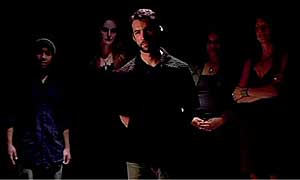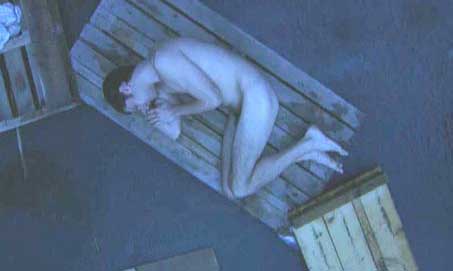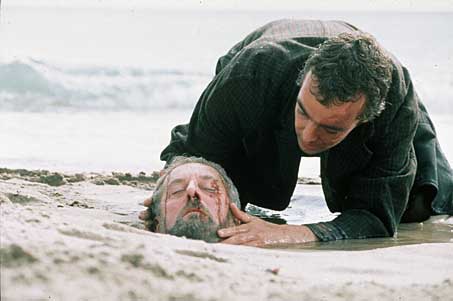
 |
||||||
|
GAY
FILM REVIEWS BY MICHAEL D. KLEMM
|
||||||
|
Socket TLA
Releasing, Director/Screenplay: Starring: Unrated, 90 minutes
Amnesia: TLA
Releasing, Director: Screenplay: Starring: Unrated, 90 minutes
Madagascar Skin Waterbearer Films, 1996 Director/Screenplay: Starring:
Unrated, 93 minutes
|
Now
For Something Completely Different
Bill (Derek Long) is a surgeon who has miraculously survived being struck by lightning in a freak accident. While recuperating in the hospital, a handsome intern named Murphy (Gone, But Not Forgotten's Matthew Montgomery) takes more than a passing interest in the equally handsome doctor. Murphy tells Bill that he was also hit by lightning and that it changed his life. He cryptically gives the doctor a card with a phone number, and tells him to call when he realizes that things aren't the same anymore and starts to get restless. |
 It
isn't long before Bill, formerly a disciple of Oscar Madison, has become
obsessed with "order," cleaning his house, and organizing and shelving the
books that used to litter his living room floor. His television set is always
on, displaying static, and he finds himself touching its screen and feeling...
something. One night he calls the number that Murphy gave him and then drives
to a tenement in an industrial part of town. There he meets Murphy and a
mysterious group of people who have all survived being hit by lightning.
After introductions, the assembly joins their hands in a circle, clamps
jumper cables onto a large generator, and shocks themselves into a state
of ecstasy. It
isn't long before Bill, formerly a disciple of Oscar Madison, has become
obsessed with "order," cleaning his house, and organizing and shelving the
books that used to litter his living room floor. His television set is always
on, displaying static, and he finds himself touching its screen and feeling...
something. One night he calls the number that Murphy gave him and then drives
to a tenement in an industrial part of town. There he meets Murphy and a
mysterious group of people who have all survived being hit by lightning.
After introductions, the assembly joins their hands in a circle, clamps
jumper cables onto a large generator, and shocks themselves into a state
of ecstasy. |
|
|
|
|
 Parts
of this film are genuinely creepy. When Murphy's group describes their "rebirths"
when each was hit by lightning, and how they began to crave electric shocks,
it almost sounds like an AA meeting. Substitute heroin or crystal meth for
electricity and you can see that some of them have serious substance abuse
issues. Picture Trainspotting re-imagined as a Twilight Zone
or Outer Limits episode. Parts
of this film are genuinely creepy. When Murphy's group describes their "rebirths"
when each was hit by lightning, and how they began to crave electric shocks,
it almost sounds like an AA meeting. Substitute heroin or crystal meth for
electricity and you can see that some of them have serious substance abuse
issues. Picture Trainspotting re-imagined as a Twilight Zone
or Outer Limits episode. |
|
|
And, for those who demand ample eroticism in their thrillers, Socket won't disappoint. Bill, with his hairy chest and Murphy, with his stubble beard, are two very sexy men and they are hot together. Their passion is believable, even when they are plugging themselves into wall sockets for an extra kick. |
|
|
Matthew
Montgomery also appears in: Derek Long also appears
in:
|
|
 |
|
| Amnesia: The James Brighton Enigma begins by asserting that, while the film is a work of fiction, it is based on actual events. A young American man wakes up, naked, in a parking lot outside of the Black and Blue Rave, one of Montreal's biggest gay circuit parties. The man has no memory of anything, except that he is gay. After a series of social workers produce no results - except for helping him to remember that his name might be James Brighton - Gay SOS, an outreach group, takes the man in and tries to help him recover his identity. Through their efforts, his family comes to reclaim him after he appears on television. | |
|
|
|
|
The first 2/3 of Amnesia is quite gripping but then it comes to a grinding halt. (I won't reveal why because, again, it would give away too much.) It picks up again during Sylvie's summary narration, with accompanying flashbacks, about the trauma that happened to James on the road to Montreal. It solves the mystery for the audience but, unless I missed something, it is all speculation and she couldn't possibly know anything about this since James has no memory of the events himself. |
|
|
This one also isn't about homosexuality, it simply features a man who happens to be gay. Apparently the true events are well known in Montreal. In fact, it's also the basis of another Canadian film (that I haven't seen) entitled Saved By The Belles (2003). It features the same man being rescued by a drag queen and a party girl, and is described as being a frothy comedy.
|
|
 |
|
|
One of reviewing's challenges is learning to recognize the difference between new, innovative, ground-breaking, works of art that trash all the established "rules," and the ones that simply are just incoherent junk. No critic alive nails it every time. Nearly all of the establishment film critics panned Hitchcock's Vertigo and Kubrick's 2001: A Space Odyssey on their first releases. A critic once penned this famous two sentence review when Samuel Beckett's Waiting For Godot premiered on the French stage: "Nothing happens. Twice." Back in the stone age, when I was still taking writing and graphic design classes in college, professors always insisted that we communicate our ideas clearly but we all know that many of the greatest works of art do just the opposite. Name me one person who can pick up Ulysses or Finnegans Wake by James Joyce and figure them out without a guide. So... how do we know when a film is a new avante-garde masterpiece or if the writer was just smoking too much pot? Sometimes we just don't. And that brings me to my third review, Madagascar Skin. This is a film that, on the surface, makes little narrative sense, yet I can't get it out of my mind. |
|
|
And so the strange "love story" between Harry and Flint (Bernard Hill - The Lord of the Rings) begins. Harry, obviously attracted to the tattooed man he rescued, nurses him back to health. Flint knows that he is being cruised and, while seemingly oblivious, teases the poor Harry with tales of a girl friend that he may or may not really have, Yet, he finds an abandoned cottage for the two of them to live in. Sexual tension abounds. Will they wind up in the sack together or not? |
|
|
While one has difficulty discerning a plot, one can't help but notice the numerous parallels between the two men - the most obvious one being Harry's birthmark and Flint's tattoos. Next up are their peculiar eating habits; Harry licks his plate like an animal while Flint displays exquisite table manners - except when he swallows a live spider, crunches on a lightbulb, or devours a dead mouse. Flint is supposed to be a lowlife criminal but yet it is Harry who put the pail back, when he first discovered Flint buried in the sand, and was going to leave him there. Flint seems, at first, a tad cruel but Harry shows how nasty he can be when he talks about hating beautiful people and wanting to watch them get crushed under the wheels of a subway train. |
|
|
What is going on between these guys? Why does Flint let Harry groom him? Why does he say that he is a third generation Steeple Guy because "we're mad on erections?" Most cryptic is Flint's remark that he likes how Harry looks and that the birthmark on his face "stops you from looking like a pouf." |
|
|
I'd like to point out that writer/director Chris Newby's odd little opus was co-produced by Britain's Channel 4, which, in the past, has also brought us such groundbreaking faire as Stephen Frears' My Beautiful Laundrette and the original Queer as Folk. This is not a conventional film. Most viewers will probably be irritated by it. But, if you're weird like me, and have a little patience, the film yields many riches. No one grasped in 1960 that Michelangelo Antonioni's long endless scenes in L'Avventura were intentionally designed that way to mirror the characters' ennui. So, I pose the question again, how do we know when a film is a new avante-garde masterpiece or if the writer was just smoking too much pot? I'll be honest, I don't know what the filmmakers were trying to say, but I can't stop thinking about it. And sometimes it's fun to take a walk on the wild side and go on an adventure.
|